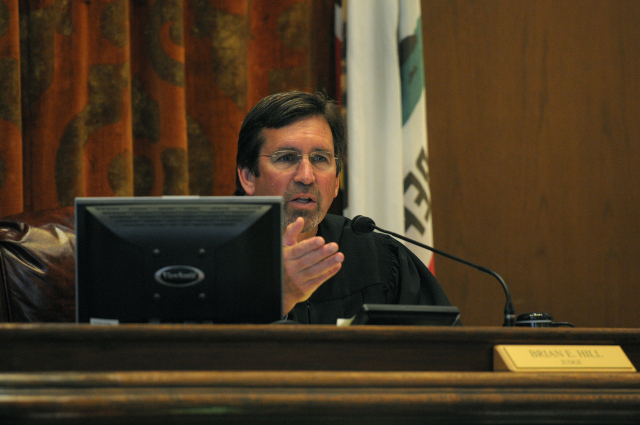Legal Grey Area Clouds Pot Shop Case
Judge Cites Unclear State Laws in Sentencing Joshua Braun

You have to wonder if folks in the Santa Barbara County District Attorney’s Office are happy with this one. Tuesday afternoon in Judge Brian Hill’s courtroom, former medical cannabis club owner Joshua Braun — a man who was once described by members of area law enforcement as a “sort of Svengali of Southern California’s medical marijuana scene” and who, along with his wife, Dayli, had a $1 million bail imposed when he was first arrested for marijuana and money laundering-related crimes in the early summer of 2010 — was sentenced to no more than 180 days in County Jail following a plea deal he and several codefendants brokered in August.
The ruling, once you factor in time served, our overcrowded jail, and California’s “half-time” waiver for nonviolent criminals, will likely result in Braun being put on some sort of house arrest or in a work release program before facing five years of felony probation. “This is not a guy who robbed a bank or just molested a child. He is not a risk to public safety,” explained Hill in handing down the sentence, before adding to Braun directly a few moments later, “I have no doubt you will be a success in the future.”

Hill’s decision was certainly not what the prosecuting attorney, Deputy DA Von Nguyen, was hoping for. Taking exception with the judge’s decision to hand down a sentence that, though echoing the Probation Department’s recommendation, was a far cry from her preferred position of 240 days in jail and immediate remanding into custody for Braun, Nguyen argued unsuccessfully for Hill to think about the impacts of criminal behavior beyond just threats to public safety. Saying that Braun knew all along that he could likely run into trouble with the law for the way he did business at Hortipharm, his medical marijuana storefront on upper State Street, Nguyen explained her frustration, “There were risks involved and he knew it … For him to just get a slap on the wrist sends the wrong message to the community.”
At the crux of Hill’s decision was what he repeatedly referred to as the “lack of clarity” in the state’s various medical marijuana laws. In the case of Braun, who ultimately pled to one felony count of marijuana sales and one misdemeanor count of money laundering after being indicted on several dozen felony charges by the Grand Jury last spring, it was the ambiguity over what exactly constituted legal behavior and monetary compensation for a person who runs a collective that provides medical marijuana to patients. At the heart of Senate Bill 420 and the corresponding state Health and Safety Codes that help flesh it out is a concept that medical marijuana cannot be distributed for profit, though “fair compensation” is allowable for the “primary caregiver” (i.e., he or she who provides the herb). For Nguyen, there was no question that Hortipharm — as evidenced by the Brauns’ two houses and assorted material possessions — was being run as a for-profit outfit and thus in flagrant violation of the law. “I believe if you are a primary caregiver you can be reimbursed and that is the end of it,” said the prosecutor. “I do not believe that the law ever intended for places like Hortipharm.” She continued that Braun did not, at least in her reading of the law, even meet the legal definition of what a primary caregiver is meant to be and that cash compensation of any kind for medical marijuana was potentially illegal.
Braun’s attorney, Josh Lynn, who himself is a former S.B. County Deputy DA, scoffed at Nguyen’s interpretations. “Profit is not permitted but compensation is more complicated than that,” he explained, before recounting the recent discovery that the head of the United Way, a nonprofit, took home roughly half a million dollars a year. Making the point that Hortipharm was being run as an officially recognized mutual benefit corporation (the first stages to becoming an actual nonprofit) at the time of its raid, Lynn opined, “Nonprofits must still compensate their employees for the business to continue.”
For his part, Braun — who had a good turnout of friends and family in the audience and, prior to this week, had not had the opportunity to publicly defend himself in a courtroom — took the occasion to explain the impact this ordeal has had on him and his young family. Choked with emotion, Braun told Hill, “I came into this thinking I was going to change the world … But I am leaving here today a felon. I lost and I lost a lot.” He went on to describe how, over the years, he had toured the Santa Barbara police chief, then-Santa Barbara Mayor Marty Blum, the Civil Grand Jury, and several other law enforcement officers through Hortipharm in an effort to be an example of a medical marijuana dispensary done right. “I absolutely believed I was following the letter of the law and not just because of what my lawyers told me,” said Braun. “It was always my intention from the beginning — it was fundamental to my philosophy — to work within the law … And I still think we did that.”
In the end, Hill admitted to seeing both sides of the proverbial coin. “I do think that the evidence suggests pretty strongly that there was a profit motive going on here,” said Hill about Braun’s business practices, but added, “A part of the problem, for both sides, is that there is a lack of clarity about what people in Mr. Braun’s position can and cannot do.” It was because of this confusion, said Hill, that a plea deal, one that found “middle ground,” was an appropriate outcome.



